First time novelists Robert Cort, Caren Lissner, and Lisa Tucker talk about themselves and their writing, accompanied by excerpts from their work.
Interviews by Caroline Tiger
Robert Cort
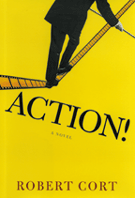
In about 18 years as a Hollywood-based producer, Robert Cort C’68 G’70 WG’74 has produced 52 movies, from Bill and Ted’s Excellent Adventure to Mr. Holland’s Opus. He never would have predicted this career path when he was an undergraduate at Penn, majoring in history. “I think I tested every graduate school at the University,” says Cort. He spent seven weeks at the law school, then dropped out and got his master’s in history in 1970, then graduated from Wharton with an MBA in 1974. This summer, Cort adds another job description to his résumé with the publication of Action! (Random House), a novel that follows three generations of a Hollywood family. The book is also a history of the town’s evolution from the crisis caused by television’s advent in 1948 to a behind-the-scenes look at today’s tinseltown, where Cort has a bird’s-eye view.
INTERVIEW
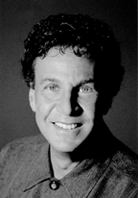
How did you get into the movie business?
It was complete fate. I’d always gone to see a lot of movies—I had to go downtown to do so while at Penn, since there weren’t any theaters on campus—but it never occurred to me when I was growing up or when I was in college that I’d work in the movie business.
In 1976, I was a management consultant at McKinsey & Company, and Columbia Pictures was one of our clients. I applied to work on a study they were doing on the marketing of major motion pictures so I could get myself and my girlfriend to L.A. for three months, as a kind of vacation. I fell in love with the business as soon as I walked onto a soundstage. I left consulting and never looked back.
How autobiographical is A.J. Jastrow, the main character in Action!?
A.J. is minor Hollywood royalty—his father was an important executive at Paramount, and his mother is the niece of the president of Paramount. His experience is very different from someone like myself, who came into the business from the outside. He is raised with the expectation that he will become a somebody in the movie industry. Like me, he dabbles in law, but mostly he never has any other idea of what he’s going to do with his life.
When did you start writing the book?
A little over four years ago—it took two years and nine months to write and another year to rewrite. I originally sold it to Random House as a history of the film business in the second half of the 20th century. I did a year and a half of research for that book and decided that people wouldn’t want to read a history book, but they might read a novel that had real characters from history interacting with fictional characters.
Why did you decide to include real people in a work of fiction?
They give the book credibility. I wanted this to be a real picture of Hollywood, of the way business is done, the evolution of the business, the relationships between the people who work in it. At the same time, I have to keep reminding people that it’s not a memoir or a history—it’s a novel.
Are you worried about the reaction that the families of real people in the book—Steve McQueen, Sam Kinison, Michael Ovitz—will have to your portrayal of them?
One of the main criteria for getting into the book was that you had to be dead! No, I’m not worried. I’m not trying to nail anybody, and their inclusion in it means they were a major player, so it should really be flattering. It’s funny because a lot of younger people don’t know who is real and who is fictional. They’ve never heard of Mike Todd, Charles Bluhdorn, Adolph Zukor.
Who’s the audience for the book?
I’m hoping it will reach more than an audience that’s Hollywood-centric. It’s gratifying when people outside the industry have recognized truths in the story about their own families, because it’s really a novel about family, and the ethical dilemmas that come up when you run a business. How much honor and morality can you maintain?
Are you working on your next novel?
I’m very much doing my day job right now, which is coming up with movie ideas and working with writers on movies that will hopefully come soon to a theater near you.
EXCERPT
The Chair Shot First
Geographically, Hollywood was built on a fault line. Emotionally, so was the film business.
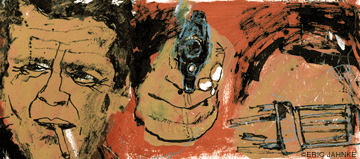
Within a week the negotiations for McQueen to star in Don’t Tread on Me turned into a debacle that threatened to scuttle the movie. Freddie Fields demanded three million dollars, 15 percent of the profits, a dozen first-class round-trip airfares to location, ten bodyguards, two chefs, and a motorcycle. Sins of the past returned to haunt AJ and Begelman. As agents they’d ravaged buyers, but as producer and studio they now had to choke down the numbers. One point, however, proved a hopeless stumbling block: Steve’s refusal to approve Russ Matovich as the director.
In order not to overshadow Russ, AJ had deliberately skipped the initial meeting between the two men. It was a mistake, because Steve immediately called to bitch that Russ’s take on the character of Farber was too dark. AJ guessed that creative differences had been less problematic than the director’s failure to acknowledge McQueen’s stature. But the battle of egos grew more complicated than their mano a mano. By forcing AJ and Columbia to fire Russ, Steve was declaring himself the boss. Screw pragmatism—that move offended AJ.
For advice he consulted the master of talent relations. Ray Stark recovered from his pique the instant AJ needed him. “If you start searching for a director who McQueen will approve, who knows what will happen. Even if you find someone else, Steve’s crazy enough to drop out anyway. Kiss him off.”
“It’s not that easy. Columbia’s salivating at the marquee. If I lose Steve, it’s going to prick the balloon. I’m worried Begelman will kill the film.”
“You can’t allow yourself to appear vulnerable. A weak producer is like the president of Poland. The studio, the director, the actors, and the crew are all waiting to march over you. You’ll live a lot longer as a son-of-a-bitch dictator.”
But without his studio stripes, AJ evolved a different slant on the geopolitics of production. He saw himself as a diplomat whose job was to forge an alliance among the talent, who distrusted—and often despised—one another, an alliance that would last long enough to get the film signed, sealed, and delivered. So he leaned on McQueen to give Matovich a second chance, then drilled Russ on how to behave.
The site of the summit was his beach cottage. Filling a cooler with beer, he fretted that both his guests were late. To kill time he picked up yesterday’s Hollywood Reporter. The lead story covered the turmoil at Paramount following the firing of Frank Yablans. An axe was hanging inches above Evans’s neck. Had AJ remained, Charlie Bluhdorn would probably have honored his promise rather than turning to Barry Diller, who was rumored to be on his way to Paramount from his post at ABC.
Matovich’s arrival cut short the what-ifs. The director turned sullen when he didn’t see McQueen. “At USC we only waited ten minutes, and that was for a full professor.”
“For the number one movie star in the world, you toss your watch.”
Geographically, Hollywood was built on a fault line. Emotionally, so was the film business. And at the epicenter of most local temblors was a movie star in a foul mood. Was that a rumble? AJ wandered out onto his deck. Sure enough, across the sand he spied Steve marching toward him. AJ hopped the railing. McQueen’s body language announced a cocaine breakfast, which was reason enough to call it a day right here. The actor had a snub-nosed Smith & Wesson stuffed into the waist of his jeans. “Loaded for bear, huh?”
“I got too many nuts trying to prove they’re tougher than me. I don’t go anywhere without it.”
“Thanks for coming.”
“You had no fucking right pushing me into this. Matovich is a punk.”
“Come on. Let’s discuss it calmly.”
McQueen followed him into the house, but politeness didn’t survive the handshakes. When AJ suggested they talk about Farber’s dilemma, Steve cut him off. “Spare me the bullshit. I like the script. I get the character. If John Ford here wants to tell me where to stand, that’s fine. But if he thinks he’s going to tell me how to act, you’re both living in a dreamworld.”
“I’m no traffic cop,” Matovich shot back.
“Russ!”
“I’m not.” He rose from his chair and paced the room.
AJ tried his last gambit. “Listen, Steve, we all respect your talent. Russ was only offering his thoughts. You make the final choices.”
“He wants me to play an antihero. That’s not Farber.”
“You misunderstood,” Matovich interjected. “I said Farber was complex. More than other parts you’ve played.”
“You think my performances are one-note?”
“If the shoe fits … “
AJ thanked God Matovich had said it under his breath.
Excerpted with permission from Action!, by Robert Cort, published by Random House. Copyright © 2003 by Robert Cort
Caren Lissner
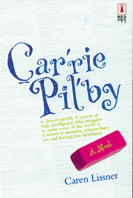
Reading the blog (or online diary) that Caren Lissner C’93 updates daily tells you nothing—and everything—about the 31-year-old newspaper editor. Her entry for 5/20/03: “Woke up, put clothes on, went to work,” is also her entry for 5/21, 5/22, and 5/23. Once in a while, she’ll mix it up by not going to work, or a friend will write in to object to the dullness of her blog. It’s the quintessential anti-blog, and Lissner created it in reaction to the hundreds of overblown blogmasters who clutter the Internet with their wide-ranging political views. Lissner, a Hoboken resident whose day job is editing the Hudson Reporter chain of weekly newspapers, calls her humor “Seinfeldian,” and her debut novel, Carrie Pilby (Red Dress Ink), has been described as “the first true anti-chick-lit novel.” The main character, Pilby, is a 19-year-old prodigy who, once freed from the womb of academia, struggles to exist in a world where social skills—of which she has zero—are as important as intellectual ability.
INTERVIEW

Did you always want to write?
I can’t not write. I always have story ideas. I’m writing in my head when I’m not writing on paper. Since I was 12, I wanted to write a book, and it wasn’t until I was in my late twenties that I realized publishing is so hard to get into, it could take me until I was in my seventies to get a book published. I realized it might never happen.
How did your Penn experience affect your writing?
I got heavily edited at The Daily Pennsylvanian in my three semesters beat reporting for them, so they taught me a lot about writing clearly and concisely. I also wrote a humor column at the DP called “Pretty Sneaky Sis” for three semesters and some commentary for The Philadelphia Inquirer. One column was on the electronic sign that wraps around the top of the PECO building. I was so excited when they made the message wrap around the entire thing instead of having a different message on each side. I was so happy that the machine could communicate with me from my dorm room.
How did you come up with the character of Carrie Pilby?
I started thinking of the moral dilemmas people have and thought it would be interesting to see society through the eyes of someone who’s smart but not socially skilled. She analyzes everything intellectually. She leaves college, and without the structure of academia, she doesn’t know what to do next.
Isn’t it risky to write such an extreme character?
Not everyone is going to like her, and I’m prepared for that. The people who do like her are the people who’ll remember what it’s like to think in black and white, and to be so sure about everything. They’ll remember what it was like before they learned to adapt and make compromises so they could fit in better.
Carrie Pilby is being shopped around to film production companies. Who do you think should play her in a movie?
All the people in my writing group say Thora Birch. I think a young actress with dark hair and glasses.
Red Dress Ink publishes novels geared toward the Bridget Jones-esque chick-lit audience. What do you think of being associated with this publishing trend?
It’s interesting that there’s a market for all of these books, and I think it’s because women have so many choices now. Our lives in our twenties and thirties aren’t just about finding a man to marry. And though Carrie Pilby is a little different—it has more of an edge—I have to be grateful for this trend, because without it I wouldn’t have been published so easily.
Who are your favorite writers?
I do have fiction writers that I like, but I’m more influenced by nonfiction writers. I like Joseph Mitchell, who wrote for the New Yorker. He had a delicate hand, he didn’t feel the need to embellish. There’s an economy of words in his work. I also like Kevin Smith [writer/director of Clerks, Chasing Amy, and other films]. His way of writing dialogue is really great—he captures peoples’ verbal tics and inflections.
What are you working on now?
My second novel, Starting from Square Two, will be out in 2004. It’s about a 29-year-old New York woman who lost her husband a year and a half before. He was her college sweetheart and she’s never had to date in the real world.
Writing about being a single woman living in New York isn’t that much of a stretch—I didn’t have to do a lot of research. My next novel will be about characters that aren’t anything like me—it isn’t something I wanted to start without having publishing contacts.
EXCERPT
“Say Something Smart”
Just because I’m smart doesn’t mean I have a complex axiom on the tip of my tongue. I mean, I do, but it’s not just because I’m smart.
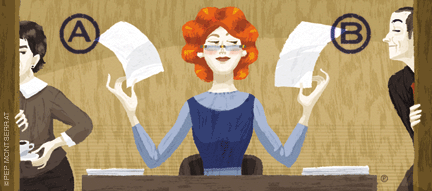
“You ever been here before?”
“No.”
The woman behind the desk peers at me through small round glasses. I don’t know what her problem is. Everyone in this office has, at some point, never been there before.
She gives me three forms to fill out, including a W-4 and a confidentiality pledge, and this wastes 20 minutes. If only the rest of the job is like this.
Then she hands me two hulking toothpaste-white stacks of paper. “The lawyers need you to compare them word for word,” she says. “A full read. It could take a few hours.”
Dad has gotten me work legal proofreading, which he says pays well and can be sporadic. I can work night or day. I’m smarter than 99 percent of lawyers, so it should be easy.
I reach my cubicle, which has a drawerless desk. This is even lower in the office furniture hierarchy than a drafting table. Behind me, an old guy in squarish glasses is reading two documents, his eyes swinging from one to the other.
He looks too old for me to consider him for a possible date. But who knows? He’s bald and unthreatening looking. Maybe I can figure out how to flirt, lure him to dinner, and then I’ll have satisfied the second requirement on Dr. Petrov’s list. That would leave me with three requirements to go.
I look over my desk. It’s rife with supplies. Someone has taken a long piece of yellow legal paper and colored in every other stripe with red flair pen, and then completely filled in the remaining stripes with Wite-Out. And that person has also drawn a box in the left-hand corner with blue ink. It’s an overgrown U.S. flag. It must have taken a good half hour to do.
A supervisor comes in to further explain my task. The first document I have to look at is an original. The second document is a version they got by scanning in the first one and printing it out. But sometimes, when they scan documents in, the new copies that get printed out accidentally have extra commas or extra letters in them, due to dirt on the scanner, marks on the original document, or something else.
So my job is to compare the original and the printout, word for word, making sure they’re exactly the same.
I’m supposed to do this for 210 pages.
It seems like there must be a faster way to perform this task in this era of technological advances. No wonder lawyers charge $400 an hour. They’re paying proofreaders to sit and play Concentration.
I lean back in the hard chair and close my eyes. Within a minute, I have my answer. But I can’t use my easier system until Oldie behind me goes to get coffee. Which, I soon find out, he does every ten minutes. And it takes him ten minutes to do it. My father thinks I don’t want to work, but the truth is, no one else is really working. It’s a big sham. No one says anything about it because they’re doing it, too. There are still tons of secrets in the world to which I am only just becoming privy.
While Oldie is gone, I take the top page of my original, put it in front of the top page of the new copy, and hold them both up to the light. They match exactly: not a line, word or dot out of place. So these pages are fine. I put them both down and move on to the next pair. I hold them up to the light, and there’s not a stray line, word or streak. This probably takes two percent of the time it would take to read the whole thing.
When I finish, I leave the document a third of the way open on my desk so it looks like I’m in the process.
I use my extra time to think about a lot of things.
I think about why, if the highest speed limit anywhere in the U.S. is 75, they sell cars that can go up to 150.
I think about whether the liquid inside a coconut should be called “milk” or “juice.”
I think about why there are Penn Stations in New York and Maryland but not in Pennsylvania.
I think about Michel Foucault’s views of the panoptic modality of power, and whether they’re comprehensive enough and ever could be.
Behind me, Oldie picks up the phone and taps at the buttons. He asks for someone named Edna. On the one percent chance this won’t be completely boring, I eavesdrop.
“Oh, I know what I wanted to tell you,” he says. “I called Jackie this morning, but she wasn’t there, but Raymond was. So Raymond tells me he’s home because he has all this sick leave saved up, you know, because teachers are allowed to accumulate their sick days, and so this is the third Friday in a row he’s taken off from school, and he was getting ready to go to the Poconos to ski. He was practically bragging about it. And I say to him, ‘Raymond, that’s lying. Sick days are if you’re sick.’ Yeah, he’s cheating the kids. I know. I know. So he backs off and says, ‘Well, I only do it once in a while.’ And I say, ‘Raymond, excuse me, but you just said you did it three Fridays in a row, so don’t back off now.’ Do you know why our daughter married someone like that? He’s amazing, bragging like that. Amazing. I said to him, work ethics like yours are why America’s going to pot. Because everyone tries to get away with everything.”
Eventually, he hangs up.
“Excuse me,” I say. “I couldn’t help overhearing. You’re annoyed because your son-in-law was goofing off. But you were just having a personal conversation on the phone for 20 minutes when you were supposed to be doing your proofreading. Isn’t this a little hypocritical?”
There is nothing more fulfilling than watching people get caught in the thick, coarse gossamer of their own hypocrisy.
Oldie is stunned. “We’re entitled to breaks,” he says, but his voice is quavering.
“I’ll take that as a yes.”
Oldie sniffs, “I don’t see why it’s any of your business,” and returns to his assignment.
I rest my eyes a bit, as there are no new assignments. Behind me, I hear a fax machine whirr, and the choppy sounds of someone’s discordant clock radio. Soon a guy with dark, tufty hair pokes his head into the room. He looks around but apparently doesn’t see whom he had hoped to. He’s ready to retreat, but then he notices me. “Hey,” he says. “You a student?”
“No,” I say. “I graduated. I’m a temp.” I’m barely able to hide my elation at the diversion. Oldie gives us both a sneer.
“You just in for tonight?”
“Far as I know.”
He extends his hand. “Douglas P. Winters. Front desk dude.” He sniffs and wipes his nose with his arm. There’s something appealing about ending your sentences with a snort. I also get the feeling he’s smart and slumming. I can spot an underemployed lazy intellectual anywhere.
“Carrie Pilby,” I say.
“You here till morning?”
“I guess so.”
“So you said you graduated already. But you look young.”
“Oh,” I say. “I am. I skipped three grades in elementary school.”
“Really?” he says. “Say something smart.”
Ugh. I hate when people do that. It’s like finding out someone’s part Puerto Rican and saying, “Say something in Spanish.” Just because I’m smart doesn’t mean I have a complex axiom on the tip of my tongue. I mean, I do, but it’s not just because I’m smart.
But I decide to play along. “I think that the influence of Kierkegaard on the works of Camus is underestimated. I believe Hobbes is Rousseau in a dark mirror. I believe, with Hegel, that transcendence is absorption.”
Doug stands there for a second. “Wow.”
I don’t tell him that I stole the whole thing from David Foster Wallace’s Infinite Jest, which I read one day when I had three hours to kill.
Oldie looks back at both of us. “You two gonna do any work tonight?”
“Why don’t you call 60 Minutes and rat out your son-in-law?” I ask. He sniffs and goes back to his work.
“Come outside,” Doug says. “I’m out front.”
I follow him through the glass doors into the waiting room, which has plush chairs and golden letters on the walls bearing the name of the firm. Doug motions to an armchair next to the security desk, and I sit.
He opens a bag of pistachios and pours a few onto the table. “So,” he asks, “you got a boyfriend?”
I wonder if he’s asking because he likes me, or he’s just making fun of me because he knows no one would want to be my boyfriend. “No,” I say nervously.
He cracks a pistachio on the table, then opens it like a tulip. “You just kind of play the field?”
“Mostly, I sleep.”
Reproduction with the permission of the publisher, Harlequin Books S.A. Copyright © 2003 by Caren Lissner. All rights reserved.
Lisa Tucker
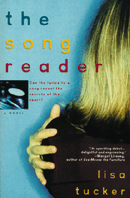
Lisa Tucker C’84 G’84 is a self-described music freak. Growing up in Missouri, her family didn’t have many books around, or even magazines, but they had a record player, and through listening to music lyrics, Tucker discovered that she loved words. Since leaving Penn, she has held down many jobs—from waitressing to teaching math at Bryn Mawr—but music has been the constant in her life. While studying psychology about 10 years ago, she started thinking about the songs that run through peoples’ heads, the songs that stick in our minds and whether they tell us anything about ourselves. That was the impetus for The Song Reader (Downtown Press), a novel about Mary Beth Norris, who makes a living by reading people’s “song charts.” Tucker lives in New Mexico with her husband, a jazz pianist, and their 14-year-old son, Miles.
INTERVIEW

When did you go to Penn?
I graduated with the class of 1984 and then went to the English grad-school program to study representations of youth in 19th-century American literature. I’m an ABD—all but dissertation. I have about 30 pages written, but I started writing the Song Reader around that time, so I stopped writing the dissertation. Maybe someday I’ll finish it.
What was your Penn experience like?
I came to Penn a poor kid from Missouri. They gave me scholarships and financial aid. I also worked full-time the entire time, from four to midnight every day as a waitress, as a key-hole puncher. I tried hard to stay awake in class—I was always pinching myself. But everything I learned, I learned there—the English department was my second home. They made me realize that even as a poor kid from Missouri, I was capable of living in the world of thought.
How did you come up with the idea for The Song Reader?
I started thinking about why people remember certain songs. I was interested in the psychology of it and song reading as a way of discovering what you’re really thinking about the things that are going on in your life. I started reading friends’ “song charts,” but I never made money from it like Mary Beth does in the Song Reader. It started as a short story and that first sentence eventually became the first sentence of my book.
Did you learn to write as an undergrad at Penn?
I never took a creative-writing class in college. It was all literature and literary criticism. But I was inspired to write by reading so much good, beautiful work. Being in grad school forever gives you an idea of what a good narrative is.
How did the book get so long when it was supposed to be a short story?
I let the characters take me where they took me. Their voices led me. It’s like listening to a voice that isn’t me and following them throughout their journey.
How does it feel to be published?
Great. This book sold really fast, but there was a whole middle period of failure before that. For four years I was trying to sell another novel I’d written. On a bold day, I sent a piece of The Song Readerto Nan Talese. She didn’t want it, but she gave it to another agent who did.
What’s next?
My second novel, Shout Down the Moon, is being published by Simon & Schuster in 2004. I’m at work on a third novel now. It’s a love story about a scientist and a spiritualist in the 19th century.
EXCERPT
Family Problems a Specialty
They said she was gifted. They swore she could see right into their hearts.
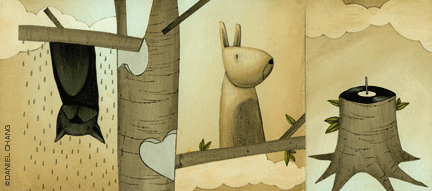
My sister Mary Beth was a song reader. Song reading was her term for it and she invented the art as far as I know. It was kind of like palm reading, she said, but instead of using hands, she used music to read people’s lives. Their music. The songs that were important to them from as far back as they could remember. The ones they turned up loud on their car radios and found themselves driving a little faster to. The ones they sang in the shower and loved the sound of their own voice singing. And of course, the songs that always made them cry on that one line nobody else even thought was sad.
Her customers adored her. They took her advice—to marry, to break it off with the low-life jerk, to take the new job, to confront their supervisor with how unfair he was—and raved about how much better off they were. They said she was gifted. They swore she could see right into their hearts.
From the beginning, my sister took it so seriously. She’d been doing readings less than a month when she had those cards printed up. Each one said in bold black letters:
Mary Beth Norris
Song Reader/Life Healer
Let me help you make sense of the music in your head.
[Family problems a specialty.]
Leave a message at 372-1891.
Payment negotiable.
She had to work double shifts at the restaurant to pay for the cards and the answering machine, but she said it was just part of her responsibilities now. “I have a calling in life,” she told me, “and I’ve got to act like it.”
I wish I’d saved one of those cards, but I wasn’t there the night she buried them at the bottom of the garbage can. It was after Ben left, and after I discovered she’d lied to me about my father. It was when the trouble with Holly Kramer was just beginning, and I still thought—like most of the town—that her talent was undeniable.
Some people even claimed she had to be psychic. After all, no one else knew that Rose was in trouble except Mary Beth; no one even suspected that Rose would take Clyde’s car on that sun-blind Saturday morning and drive it right over the sidewalk and through the glass wall of his News and Tobacco Mart except my sister, who told Rose two months before that she’d better stop seeing Clyde. From the song chart, Mary Beth knew Clyde had to be bad news. She shook her head when Rose got stuck on “Lucille” for five weeks and warned her a life can’t hold this much sadness for long. When Rose started humming “Hungry Heart,” Mary Beth knew the lid was about to blow off Rose and Clyde’s relationship. But she didn’t tell Rose I told you so when we went with Rose’s mother to bail her out of jail. She wasn’t that way with her advice, not at all.
My sister kept file cards on her customers, “song charts” neatly alphabetized in a large green Rubbermaid box in the corner of our kitchen. On Saturdays she would meet with new customers in the little room downstairs our landlady Agnes had donated to the cause—as long as Mary Beth kept the room clean and didn’t disturb Agnes’s husband’s sketches and charcoal pencils still sitting on the desk exactly as he left them when he died eighteen years before. Sometimes she gave advice at these first meetings, but usually she waited until she’d kept the chart for at least a few weeks before she gave them a reading.
They were instructed to call twice each week, on Sunday and Wednesday, and leave a short message telling her the songs and the particularly important lines they had hummed for the last few days. She had to rewind the cassette on the Phonemate back to the beginning to fit all the messages that would come in. I helped her update the charts. (It was a lot of work, especially when they reported country and western songs, which I hated.) I wrote down the titles and lines exactly as they said, even if they got it wrong, for what’s important, Mary Beth said, is how they hear the words. But if they were off on the lines, we would make a little star on their chart since Mary Beth said they might be hearing them wrong for a reason. We also made an “S” if they’d sung the lines on the machine, and a “C” if they’d sounded like they were crying or struggling not to.
Mary Beth was proud of this organized system. It allowed her to just glance at an entry and know quite a bit. For example, one of the entries on Dorothea Lanigan’s chart was the last two lines of “Yesterday.” Dorothea had changed only a word and a tense, but Mary Beth had nodded when she looked at the chart later that night and said, “Well, that’s that.”
Even I thought this one was obvious. After all, the song was about lost love, wasn’t it? “It’s too bad Dorothea and Wayne are splitting,” I said. “She must be miserable.”
Mary Beth looked up at me from the floor where she was sitting surrounded by charts and burst out in a laugh. “Leeann, they are going to be engaged by the end of the month. You mark my words.” And of course, it turned out to be true. They had their wedding the next summer. Mary Beth was the maid of honor, since Dorothea said it was all thanks to her.
It was a gift, everybody said so. Sometimes I wished I had the gift, too, but I knew I didn’t; I’d tried and failed too many times with my friends to believe otherwise. I asked them about their music and I gave them my theories, but I was always way off, and Mary Beth finally told me I was dangerous. “You can’t mess around with something like this. What if somebody believes you?”
Excerpted with permission from The Song Reader, by Lisa Tucker, a Downtown Press book published by Pocket Books, a division of Simon & Schuster, Inc. Copyright 2003 by Lisa Tucker.
Caroline Tiger C’96 is a former managing editor of Philadelphia magazine and a current freelance writer in Philadelphia. Her non-fiction book, How to Behave: A Guide to Modern Manners for the Socially Challenged, is out from Quirk Books.




